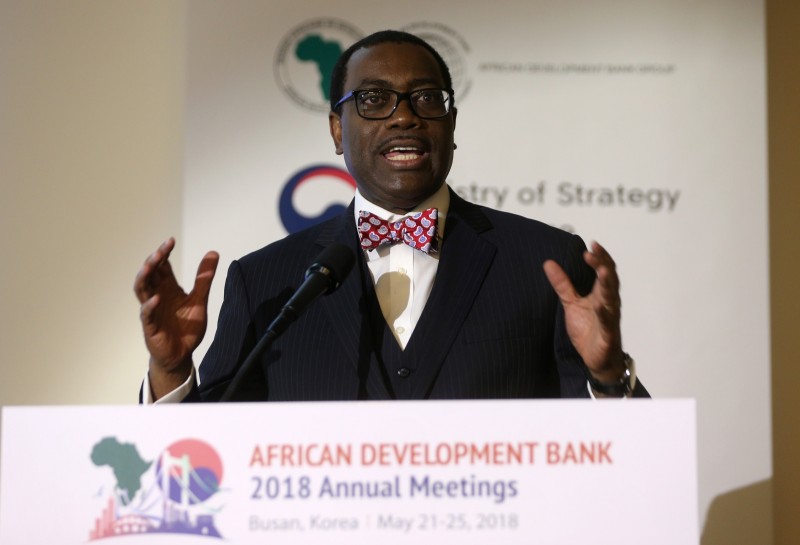The 53rd Annual Meetings of the African Development Bank opened in Busan, Korea, on Monday with a call on African Governments to create the right environment for the private sector to lead the continent’s industrial revolution. Participants also advocated for a balance between the role of the State and the private sector.
Korea was presented as a good model for industrialization which African countries can learn from.
“Korea’s example is incredible. Korea was as poor as any African country in the 1960s with a low per capital income. Today, thanks to the determination of its people and its commitment to industrialization, Korea is the 11th biggest economy in the world, an example Africa should learn from,” said African Development Bank President Akinwumi Adesina at a media breakfast.
Discussions around the media breakfast table focused on the theme of the 2018 Annual Meetings, “Accelerating Africa’s Industrialization,” and the need to tell the great stories of Africa – the story of a resurgent continent ready to take its rightful place in the industrial world.
“If you look at countries that have industrialized – China, South Korea, Singapore and many others – the role of the State was clear. One of the things that I think we need to take out of this conversation is that the State has a great role to play in Africa’s industrial revolution, particularly in terms of industrial policy, providing direction, support for infrastructure, and directing capital to particular industries,” he stressed. “Ethiopia is a very good example.”
Adesina explained that industrialization was selected as the theme of the 2018 Annual Meetings to further showcase what Africa can learn from a country like Korea.
“There is nowhere better than Korea to address this theme. Korea’s incredible success over the last 60 years provides a perfect model to the African Development Bank to redouble its efforts towards Africa’s economic development. Africa is a tremendously blessed continent, but it needs to industrialize, create lots of jobs, and be more competitive in the global market.”
For Africa to witness true agricultural transformation, technologies need to reach farmers to enhance productivity. This was the message of the Leadership4Agriculture Forum, held on Day 1 of the meetings.
“We cannot say we have leadership when we still have 65 percent of the land in Africa uncultivated. We must develop solutions to agriculture and ensure that the sector can grow to a US $1-trillion business,” Adesina said.
Participants in Monday’s Leadership4Agriculture session included Ministers and key partners involved in the development of agricultural industrialization of the continent. They emphasized the need to enhance the competitiveness of Africa’s agriculture sector and to develop industrial value chains required to power the growth of the sector to a world-class industry.
Mima Nedelcovych, President and Chief Executive, Initiative for Global Development, said the African agriculture sector required efforts to improve its competitiveness and called for reforms to ensure that low-interest rate lending is available to the agriculture sector.
“We have to take action as well as talk. Talk is important, but we also want to take people to task,” said Jennifer Blanke, the Bank’s Vice-President for Agriculture, Human and Social Development, on moving past discussing agricultural challenges to executing solutions for them.
How to leverage the continent’s youth to accelerate economic prosperity through industrialization was the focus of a session on “Bridging innovation and industry: African youth solving continental challenges.”
Badr Idrissi, a young Moroccan industrialist, co-founded ATLAN Space, a start-up that uses artificial intelligence and drone technology to solve some socio-economic problems. The innovation has helped Morocco to effectively fight illegal fishing.
“They say that artificial intelligence is not meant for Africa. We are here to prove that wrong,” Idrissi said.
Idrissi used his 12-year international work experience at Microsoft and Nokia to develop and provide tech solutions, which have created employment for several young Moroccans.
In Kenya, a young banker, Lorna Rutto, quit her job to co-found EcoPost, a social enterprise that has created thousands of sustainable jobs for people in marginalized communities, in addition to conserving the environment.
“I was inspired by what I thought was going wrong in my community. Trees were being cut down and plastic waste was all over the place,” Rutto told the session. “It was very scary for me to resign a good bank job, but I had to fulfil my ambition as an entrepreneur. That was when I developed the idea that waste was a resource and not a thing to throw away.”
EcoPost has so far transformed over 3 million kilograms of plastic waste into plastic lumber, saved over 500 acres of forest and helped mitigate climate change in Kenya.
Adesina commended the young entrepreneurs for converting challenges into opportunities and urged them to continue representing the industrialization of Africa.
“Young people are not just the future of Africa, they are the present,” said Adesina. “They represent entrepreneurship and energy. This must be nurtured, harnessed and scaled up to propel Africa’s industrial revolution and the Bank is here to harness that.”




 Premier League
Premier League